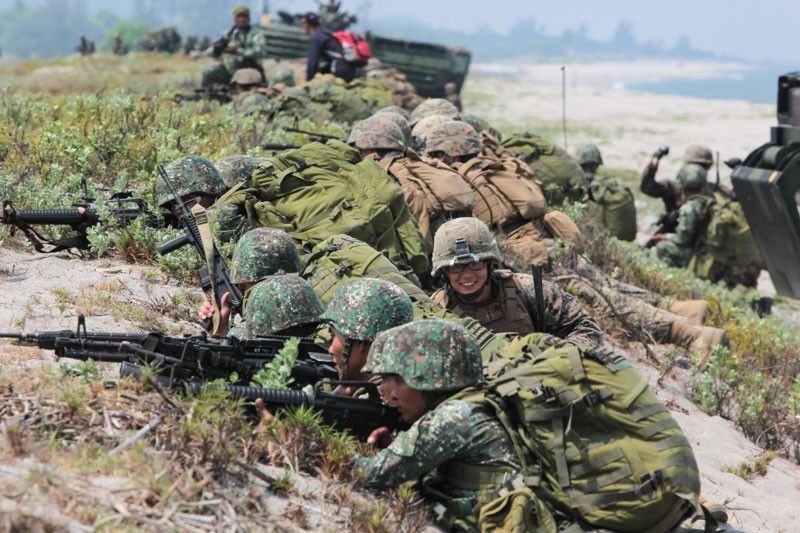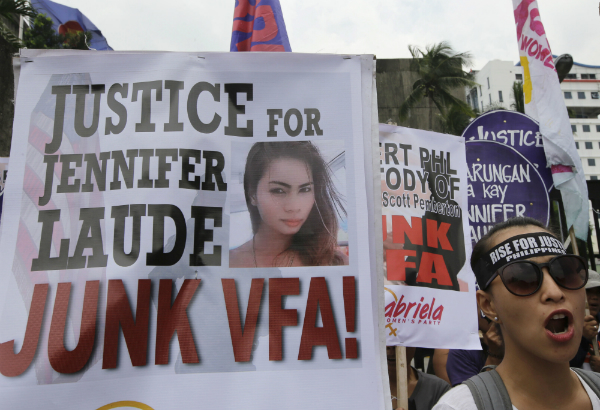Beyond Bato's US visa: A look at issues previously raised against VFA

MANILA, Philippines — President Rodrigo Duterte on Thursday night threatened to terminate the Visiting Forces Agreement between the Philippines and the United States—a call that progressive groups have been making for decades—over the cancelled US visa of Sen. Ronald “Bato” Dela Rosa.
Dela Rosa, former top cop and one of the implementors of the Duterte’s "drug war", said he was not informed why his visa was revoked—a prerogative of any sovereign state, said Justice Secretary Menardo Guevarra—but was told that he could apply again.
The senator surmised that the move was due to allegations of extrajudicial killings during his stint as the chief of the Philippine National Police.
RELATED: Human Rights Watch says Dela Rosa may face 'bigger' problems than canceled US visa soon
Duterte, in turn, told the US to “correct” the cancellation of Dela Rosa’s visa within a month or he "will terminate the VFA."
Groups have assailed the VFA as early as 1999, a year after President Joseph Estrada signed the agreement with the United States.
Here are some of the issues on the VFA raised by different groups before Philippine courts:
Bayan v Zamora: Nuclear weapons, tariff exemptions, a vote by national referendrum
Five groups of petitioners filed separate petitions for certiorari and prohibition before the SC challenging the constitutionality of the VFA in 1999.
BAYAN (Bagong Alyansang Makabayan) led the first group of petitioners.
Others who filed the pleas were groups led by Philippine Constitution Association, former Sen. Teofisto Guingona, the Integrated Bar of the Philippines and former Sen. Jovito Salonga.
According to a STAR report, the petitioners raised the following issues before the SC:
- US forces bringing in of nuclear weapons
- US forces exemption from tariffs and taxes
- Provisions of the VFA clearing servicemen from criminal liability in the violation of local laws
The petitioners also argued that Section 25, Article XVIII of the Constitution should apply.
The provision reads:
After expiration in 1991 of the Republic of the Philippines and the United States of America concerning Military Bases, foreign military bases, troops, or facilities shall not be allowed in the Philippines except under a treaty duly concurred in by the senate and, when the Congress so requires, ratified by a majority of the votes cast by the people in a national referendum held for that purpose, and recognized as a treaty by the other contracting State.
Following the provision, the petitioners raised that the concurrence of 2/3 of the Senate is just one of the requirements to make the agreement binding to the Philippines.
It states that “foreign military bases, troops, or facilities” may only be allowed in the country “only by virtue of a treaty duly concurred in by the Senate, ratified by a majority of the votes cast in a national referendum held for that purpose if so required by Congress, and recognized as such by the other contracting state.”
But the government countered that the VFA is “not a basing arrangement but an agreement which involves merely the temporary visits” of American military. They said the Senate’s constitutional power to concur is governed by Section 21, Article VII which reads:
No treaty or international agreement shall be valid and effective unless concurred in by at least two-thirds of all the Members of the Senate.
The SC however said that Section 25, Article XVII is not controlling on the VFA involves foreign troops and facilities only and not foreign bases.
The Court also held that the president holds the power for ratification, “through which the formal acceptance of the treaty is proclaimed.”
“The negotiation of the VFA and the subsequent ratification of the agreement are exclusive acts which pertain solely to the President, in the lawful exercise of his vast executive and diplomatic powers granted him no less than by the fundamental law itself,” it added.
The Senate, meanwhile, “is limited only to giving or withholding its consent, or concurrence, to the ratification.”
The SC voting 11-3 held that there was no grave abuse of discretion when Estrada ratified the VFA.
Neri Colmenares, then representative of Bayan Muna party-list, again raised the issue in 2013 in arguing against an increased rotational presence of US troops in the Philippines, saying in an ANC interviw that "the Constitution is very clear [that there should be]no foreign troops, bases or facilities shall be allowed entry into the Philippines absent a treaty."
He said that the VFA "violates the will of the Filipino people for ousting the bases in 1991."
He said then that US military presence actually makes the Philippines less secure.
"The bases or military presence of the US in the Philippines are magnets for attack. All their enemies across the world, and the Americans have many enemies, will consider us as legitimate targets because, you know, we are helping the Americans," Colmenares said.
Nicolas vs Romulo, 2009: The detention of Daniel Smith
Three groups of petitioners brought provisions of the VFA before the high court in 2009, as an offshoot of their appeal on the rape case against US Marine Lance Corporal Daniel Smith.
Smith was convicted for the rape of “Nicole”, a Filipina, in 2005. He was later acquitted by the Court of Appeals.
“Nicole” filed the first petition, and was followed by the filing of two other groups led by Salonga and BAYAN.
But Smith was taken out of Makati City Jail and brought to a detention facility of the US government, provided by the Romulo-Kenney Agreement signed in December 2006.
It held that under the VFA, “Lance Corporal Daniel J. Smith, United States Marine Corps, be returned to U.S. military custody at the U.S. Embassy in Manila.”
The petitioners argued that Smith should be under the custody of the Philippines “because, first of all, the VFA is void and unconstitutional.”
But the court again held that VFA is constitutional, as it was “duly concurred in by the Philippine Senate and has been recognized as a treaty by the United States.”
RELATED: Supreme Court affirms ruling on VFA constitutionality
But the SC noted that under the VFA, detention shall be by Philippine authorities, and should be in facilities agreed upon by both countries.
“Respondents should therefore comply with the VFA and negotiate with representatives of the United States towards an agreement on detention facilities under Philippine authorities,” the court held.
"We don't have criminal jurisdiction over American troops who commit crimes... in the US, if a Filipino [soldier] commits a crime, the US will put him to prison," Colmenares said in 2013.
"Secondly, we are also forming social ills like prostitution," he also said then.
The case of Jennifer Laude
In 2015, an Olongapo court convicted US Marine Lance Corporal Joseph Scott Pemberton for the killing Filipino transgender woman Jennifer Laude.
Laude was strangled and found dead inside a toilet in a motel in Olongapo.
Pemberton was convicted of homicide and will face imprisonment from six to twelve years.
RELATED: US won’t waive custody
Gabriela earlier said that the case of Laude and “Nicole” are arguments against VFA and the Enhanced Defense Cooperation Agreement between the US and the Philippines.
“There are other victims who have not been able to find strength to voice out their experiences of VAW [violence against women] perpetrated by US troops, not just in the Philippines but in other countries as well,” Gert Ranjo-Libang, then Gabriela vice chair, said.
She added: “All of them are proof that anywhere the US troops are present, cases of violence against women are not far behind.”
- Latest
- Trending





























